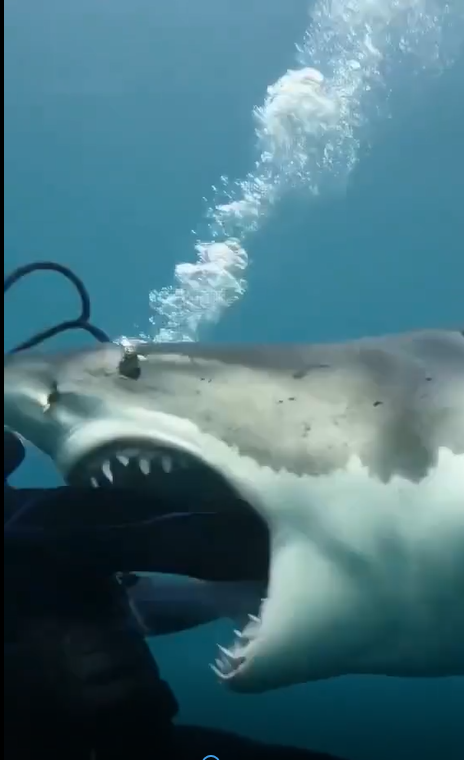It started as a perfect day for an experienced diver named Liam Carter, a man who had spent years exploring the deep blue. The ocean was his second home — calm, alive, and endlessly fascinating. He’d always believed that respect and trust could bridge any gap between man and nature.
On that fateful morning off the coast of South Africa, the sea was calm, the light filtering through the water like glass. Liam had been diving for years, documenting marine life for a conservation project. His focus that day: a great white shark he had been observing for weeks.
The shark, massive yet graceful, had grown used to Liam’s presence. It would circle close, its movements measured and curious. Over time, he started to believe the creature recognized him — that they had formed a kind of understanding.
His fellow divers warned him not to get too comfortable. “They’re still wild, Liam,” one of them said. “No matter how calm they look, never forget what they are.” Liam just smiled. “She’s not like the others,” he replied. “She’s gentle.”
For thirty minutes, everything went according to plan. The shark glided through the water, slow and majestic. Liam floated beside it, recording every movement with his camera. He reached out his hand, something he had done before — a soft gesture of trust.
Then, in a flash, everything changed. The shark pivoted sharply, its black eyes narrowing, and before Liam could react, it lunged. The ocean that had felt like home suddenly became a battlefield. Its jaws clamped down on his arm with unimaginable force.
His scream was swallowed by the water. His camera dropped, spiraling into the deep as blood clouded his view. Instinct took over — he kicked, twisted, punched — anything to break free. The world narrowed to pain, fear, and the desperate will to survive.
For a moment, he thought it was over. The shark released him, then circled back, brushing past as if testing its prey. His oxygen gauge was dropping. His arm was shredded, the pain searing through his entire body. Panic threatened to consume him.
But something inside him refused to give up. With one good arm, he pushed toward the surface, every second a fight against fading consciousness. He could see the sun’s shimmer above — so close, yet impossibly far.
The rescue team had seen the commotion from the boat. They dove in, pulling him out just as he blacked out. The ocean that had once embraced him now looked like a vast, merciless expanse — beautiful, but unforgiving.
When he woke up in the hospital, his arm was wrapped in bandages, his body trembling from trauma and loss of blood. Doctors said he was lucky to be alive. Most don’t survive an attack like that. Liam barely believed it himself.
Reporters called him “the man who trusted the wrong shark.” His video footage spread across the internet, shocking millions. People debated his actions — some called him reckless, others brave. But Liam didn’t care about fame or judgment.
“I don’t blame the shark,” he told an interviewer later. “It wasn’t evil — it was instinct. I forgot that even the most beautiful parts of nature can still be dangerous.” His words resonated with millions who saw his story as a cautionary tale of respect and humility.
Months passed. His body healed, but the scars remained — both seen and unseen. Yet, somehow, Liam found the strength to return to the ocean. He couldn’t stay away. It was where his soul belonged.
He no longer swam too close. No longer tried to touch. Instead, he observed from a respectful distance, reminding others that nature demands balance, not control. That trust must always be earned, never assumed.
The shark that attacked him was later spotted again — alive, healthy, and still ruling her territory. Liam smiled when he saw the footage. “She survived too,” he said softly. “We both did.”
His story became a symbol of survival and perspective — a reminder that courage isn’t just facing danger, but learning from it. Liam’s mistake nearly cost him his life, but it also gave him wisdom few ever find.
Now, every time he dives, he carries the memory of that day like an invisible scar — a silent reminder that even in betrayal, there can be understanding. The ocean, after all, never truly belongs to us.
And though he still bears the marks of that fateful encounter, Liam often says he wouldn’t change a thing. “She reminded me,” he says, “that the wild doesn’t owe us gentleness — but it will always deserve our respect.”

